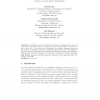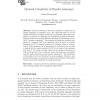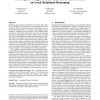11 search results - page 1 / 3 » Orthogonal Concatenation: Language Equations and State Compl... |
JUCS
2010
13 years 7 months ago
2010
: A language L is the orthogonal concatenation of languages L1 and L2 if every word of L can be written in a unique way as a concatenation of a word in L1 and a word in L2. The not...
CORR
2009
Springer
13 years 7 months ago
2009
Springer
The past research on the state complexity of operations on regular languages is examined, and a new approach based on an old method (derivatives of regular expressions) is presente...
FSMNLP
2005
Springer
14 years 2 months ago
2005
Springer
TAGH is a system for automatic recognition of German word forms. It is based on a stem lexicon with allomorphs and a concatenative mechanism for inflection and word formation. Wei...
CORR
2006
Springer
13 years 9 months ago
2006
Springer
The well-known problem of state space explosion in model checking is even more critical when applying this technique to programming languages, mainly due to the presence of complex...
ICFP
2010
ACM
13 years 10 months ago
2010
ACM
Reasoning about program equivalence is one of the oldest problems in semantics. In recent years, useful techniques have been developed, based on bisimulations and logical relation...



